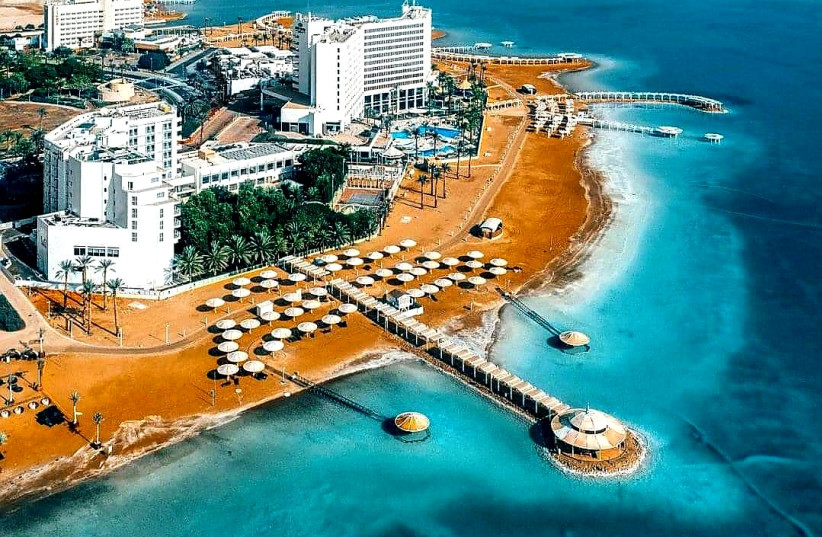Collection hotels might be the future of the industry in Israel, as apparently this is what guests are demanding
Entering Jaffa’s impressive, renovated, well-maintained building that once housed the School of the Sisterhood of Saint Joseph convent and adjacent 19th-century former French hospital, you will be impressed.
An extensive seven-year restoration, preservation and renovation created an impressive boutique accommodation – The Jaffa luxury hotel. A partly hidden sign indicates that the hotel is part of a luxury collection. To the puzzled traveler it might be an enigma, but for the experienced one it is an indication of the best there is. Yet no sign, board or any clue makes the guest aware that the hotel is part of the mighty Marriott hotel brand.
The term “collection” as far as hotels are concerned is creating a global buzz, and The Jaffa may be the harbinger that indicates that a rise in international collections is coming.
What are these collection hotels? In most cases these are a collection of independent hotels that join a major brand’s platform while retaining their own names and branding.

This trend is called soft-branding or umbrella-branding established by recognized hotel chains to meet the increasing demand of hotel experiences. In recent years the hospitality industry is fostering individuality. They appeal to hotel owners that do not wish to be held to strict standards of a classic brand.
However, they eat the cake and have it at the same time. They operate their hotels themselves, under a recognized brand. This joint venture is a win-win that allows for the proliferation of soft brands.
At the same time it energizes the individual existing hotel, and owners enjoy the strong distribution of a reputed brand network. The bonus is the exposure to millions of loyalty club members, who love to receive perks like complimentary breakfast, room upgrades and hotel credits.
For the global brands it is like opening a box of candies – a potential for huge growth, as they are interested in signing as many hotels as they can to their commercial systems. In no time they assure immediate positive cash flows with no risk at all.
Marriott’s Luxury Collection is defined as “comprised of world-renowned hotels and resorts offering unique, authentic experiences that evoke lasting, treasured memories.”
“The Jaffa is a unique historic luxury property that Marriott is proud to have in its portfolio and to expose to more than 140 million members of its Bonvoy loyalty program,” says General Manager Michael Schmid. “Our standards are similar to our luxury Ritz Carlton brand, but we try to be less formal in keeping our individuality.”
Isrotel, one of Israel’s dominant hotel chains, announced last December a new branding, which classifies its hotels into three segments. “Isrotel Collection – the vacation and resort hotels suitable for families. Exclusive – the chain’s luxury hotels, and Design – hotels of up to 200 rooms, emphasizing design experience,” says Nahum Kara, Isrotel’s head of sales and marketing.
However those hotels will clearly carry the company name publicly. What is interesting is its Design’s Publica hotel in Herzliya, introducing a mysterious sign at the entrance – Autograph Collection.
This collection is a group of independent upscale-to-luxury hotels within the Marriott International portfolio. This brand’s properties are independently owned and operated under the Autograph Collection name.
“The Ella brothers, the Publica co-owners, successfully initiated that cooperation with Marriott when the hotel was launched,” explains Kara.
The Autograph experience itself caters to unique preferences, such as culinary, historical exploration, arts, family, sports and urban tours – surely aiming for the Millennials, which dominate Herzliya Pituah workplaces.
How significant is the collection buzz? It’s the future of the industry, as apparently this is what Millennials will demand. Israeli tourism expert Joseph Fischer, with 40 years of experience working for leading international hospitality brands, is confident.
“If there’s something that the corona pandemic should teach the lodging sector, it is that constant change is here to stay. All those big old ‘cookie-cutter’ brands lost their attractiveness in the new world led by Millennials. Nowadays, it’s all about creating experiences and memories, and not about hard standards – room sizes and executive lounges. The collection is a good solution for big brands that want to stay attractive,” he says.
Indications here are starting to pop up. Only recently, Hilton announced plans to introduce for the first time two of its collection hotels in Israel. The LXR and Curio properties on Tel Aviv’s waterfront next to Independence Park. They are scheduled to open in 2026.
Will other international or Israeli brands follow with their own collection portfolio?
Stay tuned. For us, the customers, this is great news. We are exposed to endless new hospitality opportunities and surprises, with competitive prices and pampering rewards for memorable experiences, while the collection variant is buzzing.
The writer was, until recently, the spokesperson for Hilton Hotels in Israel.
